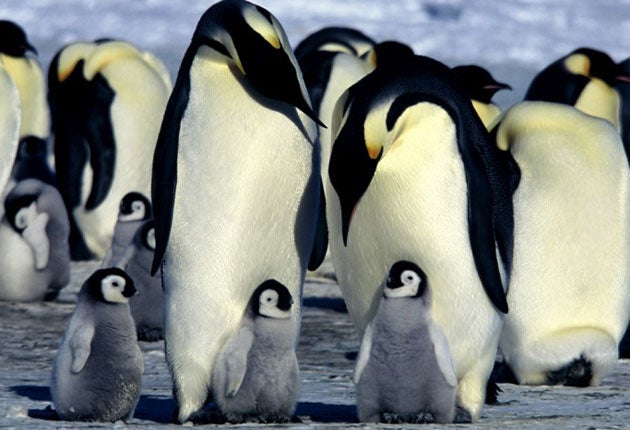Emperor penguin 'marching to extinction by end of the century'

The Emperor penguin is marching towards extinction because the Antarctic sea ice on which it depends for survival is shrinking at a faster rate than the bird is able evolve if it is to avoid disaster, a study has found.
By the end of the century there could be just 400 breeding pairs of Emperor penguins left standing, a dramatic decline from the population about about 6,000 breeding pairs that existed in the 1960s, scientists estimated.
The latest assessment of the future size of the Emperor penguin population is based on the projected increase in global temperatures and subsequent loss of sea ice due to the changes in the Antarctic climate that are expected in the 21st Century, the study found.
Scientists based their pessimistic outlook on the long-term changes to the number of Emperor penguins in a colony living in a part of the Antarctic Peninsula called Terre Adelie, which has been surveyed regularly since 1962 and has experienced regional warming over the past 50 years.
The study by Stephanie Jenouvrier and Hal Caswell of the Woods Hole Oceanographic Institution in Massachusetts concluded that there is at least a 36 per cent probability of “quasi extinction” of the Emperor penguin -- when the population declines by at least 95 per cent -- by the year 2100.
“To avoid extinction, Emperor penguins will have to adapt, migrate or change the timing of their growth stages,” the scientists report in the journal Proceedings of the National Academy of Sciences.
“However, give the future projected increases in greenhouse gases and its effect on Antarctic climate, evolution or migration seem unlikely for such long-lived species at the remote southern end of the Earth,” they say.
Emperor penguins are probably unique among birds in that they hardly ever set foot on land. They breed, raise their young and feed from floating platforms of sea ice that forms each Antarctic winter.
Fluctuations in sea ice during the 1970s, and the effect that it has on the penguin population, were used as a model of what could happen on a larger scale during the next 100 years or so of climate change.
"The key to the analysis was deciding to focus not on average climate conditions, but on fluctuations that occasionally reduce the amount of available sea ice," said Dr Caswell, an expert in mathematical ecology.
"This analysis focuses on a single population, that at Terre Adelie, because of the excellent data available for it. But patterns of climate change and sea ice in the Antarctic are an area of intense research interest now. It remains to be seen how these changes will affect the entire species throughout Antarctica," Dr Caswell said.
Dr Jenouvrier said that if future climate change happens as predicted by the Intergovernmental Panel on Climate Change, the penguin population ion Terre Adelie will probably decline dramatically in the coming decades.
"Unlike some other Antarctic bird species that have altered their life cycles, penguins don't catch on so quickly," Dr Jenouvrier said.
"They are long-lived organisms, so they adapt slowly. This is a problem because the climate is changing very fast," she said.
Emperor penguins are renown for the way the males are left to incubate the eggs on the sea ice through the long Antarctic winter while the females return to the sea to feed.
In August, at the end of the Antarctic winter, the females return to feed the newly-hatched young as the males go to fatten up -- they lose 40 per cent of their body weight during the winter months.
In the next few weeks, both parents take it in turns to feed until the chick is old enough to join other chicks that huddle together in groups to keep warm. In December, with the winter sea ice breaking up, the entire family march together to the open sea to feed.
Join our commenting forum
Join thought-provoking conversations, follow other Independent readers and see their replies
Comments
Bookmark popover
Removed from bookmarks